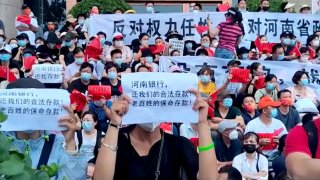Banking Waves: China to Release Frozen Bank Funds After Rural Protests
The bank protests have come amid a broader slowdown in the Chinese economy, which is estimated to have grown by an anemic one percent during the second quarter of 2022.
A consortium of four rural banks in China’s Henan and Anhui provinces reportedly agreed to partially return bank deposits to irate customers on Monday after initially freezing their accounts, prompting a rare set of public demonstrations in the country, according to AP.
The Chinese government’s financial regulation agency issued a statement on Monday evening announcing that customers of the banks with deposits of less than 50,000 yuan, or roughly $7,500, would immediately receive any funds they had deposited. In contrast, customers with larger account balances would be reimbursed later. The announcement was made after protesters converged on the city of Zhengzhou, Henan’s capital, to protest outside the headquarters of the People’s Bank of China, China’s central bank, and the China Banking and Insurance Regulatory Commission, which had initially taken no action on the estimated $1.5 billion in frozen funds. In previous weeks, Chinese authorities had attempted to thwart protests by imposing COVID-19-related restrictions via an app on protesters’ phones. Despite this restriction, protesters gathered in Zhengzhou on Sunday, where police and plainclothes security forces broke up a demonstration, reportedly leading to several hospitalizations.
The law requires the People’s Bank of China to protect bank customers’ deposits up to 500,000 yuan, or roughly $75,000. The Chinese central bank fulfills a similar role to the Federal Deposit Insurance Corporation (FDIC) in the United States, which guarantees deposits from bank failure up to $250,000. However, some bank customers deposited more than 500,000 yuan in their accounts with the six frozen banks, leading to concerns that they could lose their money if the situation remains unresolved.
Bank customers in Henan and Anhui were reportedly incentivized to open accounts at the six rural banks due to the high interest rates they offered—rates exceeding four percent annually, far higher than typical interest rates in the United States. However, the banks’ funds have been frozen since April, allegedly due to their connection to organized criminal activity, leading thousands of depositors to demand their money back and voice frustration with Chinese regulatory agencies’ unwillingness to intervene on their behalf.
The bank protests have come amid a broader slowdown in the Chinese economy, which is estimated to have grown by an anemic one percent during the second quarter of 2022—its lowest rate since the first quarter of 2020 when Chinese GDP shrunk by nearly seven percent.
Trevor Filseth is a current and foreign affairs writer for the National Interest.
Image: Reuters.

